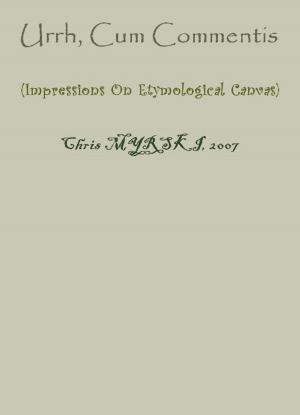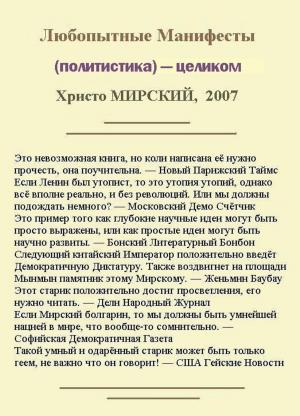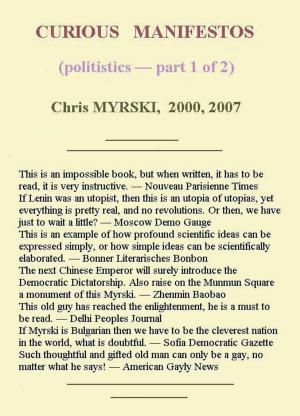| Author: | Chris Myrski | ISBN: | 9781370367733 |
| Publisher: | Chris Myrski | Publication: | September 1, 2017 |
| Imprint: | Smashwords Edition | Language: | English |
| Author: | Chris Myrski |
| ISBN: | 9781370367733 |
| Publisher: | Chris Myrski |
| Publication: | September 1, 2017 |
| Imprint: | Smashwords Edition |
| Language: | English |
This is philosophical book, what means that it is serious reading, not for to fall asleep, though, surely, some of you may use it also for that purpose, because to many readers it may really have somnolent effect. But here you will find no citations and critiques of existing philosophical trends, no unknown to the general public terminology, what means that it is also popular book. It is maximally unprejudiced, in contrast to many philosophical books, which, in spite of their pretensions to be universal and all-embracing are at least tendentious, because their authors feel obliged to defend someone's interests. In addition to this, in their desire to be exact and non contradictory, they are forced, either to exclude the contradictions from the books starting with some basic assumptions, but in this way they unavoidably delimit the subject of investigation and show the things unilaterally, or else risk to be exposed to attacks for inexactness and metaphysics. In other words, the philosophy, more than the other sciences, suffers from the problem of decomposition of the infinitely complex and interrelated real world (and here the word “infinitely” can't be substituted with “very”, because it is something more than “the most”), but if one natural process is not decomposed it can't be observed precisely enough, so that this is one unavoidable suffering (something like the birth pangs, without which, at least till the moment, the continuation of life is impossible).
Because of the partiality of philosophical currents it happens that they are very many and exclude one another, similarly to the religions, something that is not characteristic for the private sciences, because there are not many mathematics, or physics, or medicines, and so on. Though there are various subdivisions or branches of these sciences they, as a rule, don't dispute one with the other, for they have different spheres of activity or object areas, and even when their areas overlap, how is with the classical, eastern, and folk medicines, then neither of them questions basic principles, like this that the heart of the humans is in the left part of the chest, that he has two hands with five fingers, etc., but just give alternative approaches. In the same time in the philosophy they argue for centuries whether the matter comes before the idea about it, what for one cyclical process is meaningless, and is paraphrasing of the question about the egg and the hen, about which I doubt that even a child already attending school will begin to argue (but the philosophers do this).
The cynicism of the author consists chiefly in this, to pronounce various, even shocking, statements, not making any efforts for applying of the necessary anti-shock therapy, when these statements are true in many life situations, because of primary value for him is the truthfulness of the said, not its aesthetical, moral, ideological, and so on sides. There is, however, one important moment with the cynicism: it may be shocking, but it is /interesting/, because each society strives to establish some euphemistic norms and in this way it denies the cynical truths, and also the forbidden fruit is almost always sweeter. So that, maybe, these cynical essays would appeal to some of the readers? In any case, the cynicism is not contagious disease, neither leads to addiction, and is healed very easy with ... watching the media for three months or so, after which there are no recidives.
Especially for you I have written an acrostic in 2017 that have put directly on the cover.
This is philosophical book, what means that it is serious reading, not for to fall asleep, though, surely, some of you may use it also for that purpose, because to many readers it may really have somnolent effect. But here you will find no citations and critiques of existing philosophical trends, no unknown to the general public terminology, what means that it is also popular book. It is maximally unprejudiced, in contrast to many philosophical books, which, in spite of their pretensions to be universal and all-embracing are at least tendentious, because their authors feel obliged to defend someone's interests. In addition to this, in their desire to be exact and non contradictory, they are forced, either to exclude the contradictions from the books starting with some basic assumptions, but in this way they unavoidably delimit the subject of investigation and show the things unilaterally, or else risk to be exposed to attacks for inexactness and metaphysics. In other words, the philosophy, more than the other sciences, suffers from the problem of decomposition of the infinitely complex and interrelated real world (and here the word “infinitely” can't be substituted with “very”, because it is something more than “the most”), but if one natural process is not decomposed it can't be observed precisely enough, so that this is one unavoidable suffering (something like the birth pangs, without which, at least till the moment, the continuation of life is impossible).
Because of the partiality of philosophical currents it happens that they are very many and exclude one another, similarly to the religions, something that is not characteristic for the private sciences, because there are not many mathematics, or physics, or medicines, and so on. Though there are various subdivisions or branches of these sciences they, as a rule, don't dispute one with the other, for they have different spheres of activity or object areas, and even when their areas overlap, how is with the classical, eastern, and folk medicines, then neither of them questions basic principles, like this that the heart of the humans is in the left part of the chest, that he has two hands with five fingers, etc., but just give alternative approaches. In the same time in the philosophy they argue for centuries whether the matter comes before the idea about it, what for one cyclical process is meaningless, and is paraphrasing of the question about the egg and the hen, about which I doubt that even a child already attending school will begin to argue (but the philosophers do this).
The cynicism of the author consists chiefly in this, to pronounce various, even shocking, statements, not making any efforts for applying of the necessary anti-shock therapy, when these statements are true in many life situations, because of primary value for him is the truthfulness of the said, not its aesthetical, moral, ideological, and so on sides. There is, however, one important moment with the cynicism: it may be shocking, but it is /interesting/, because each society strives to establish some euphemistic norms and in this way it denies the cynical truths, and also the forbidden fruit is almost always sweeter. So that, maybe, these cynical essays would appeal to some of the readers? In any case, the cynicism is not contagious disease, neither leads to addiction, and is healed very easy with ... watching the media for three months or so, after which there are no recidives.
Especially for you I have written an acrostic in 2017 that have put directly on the cover.















